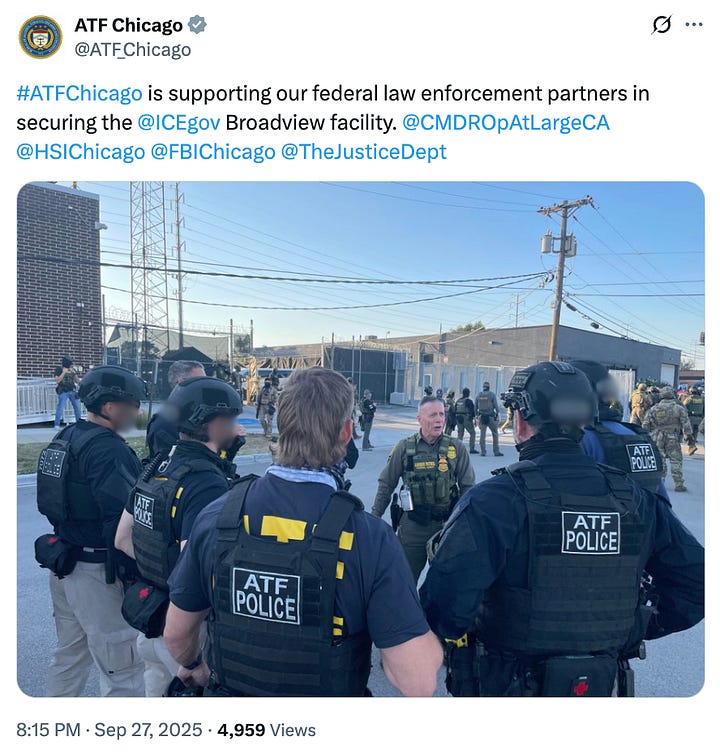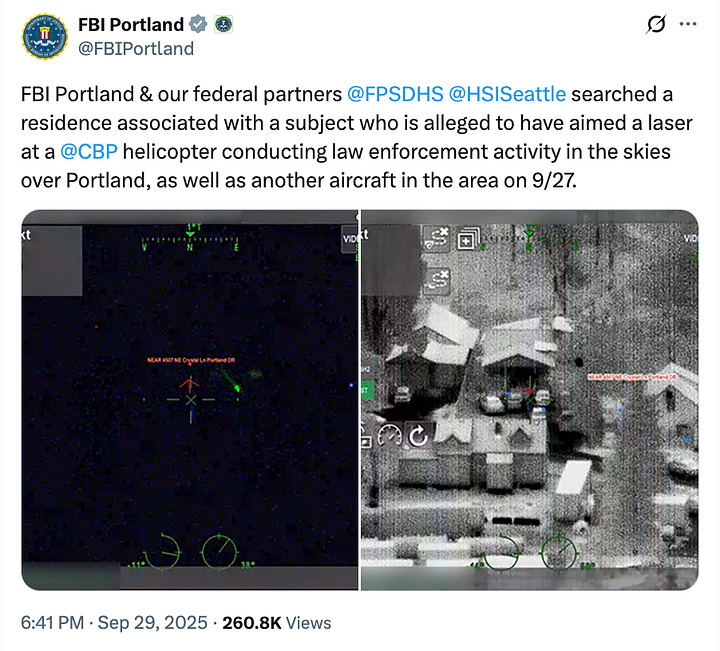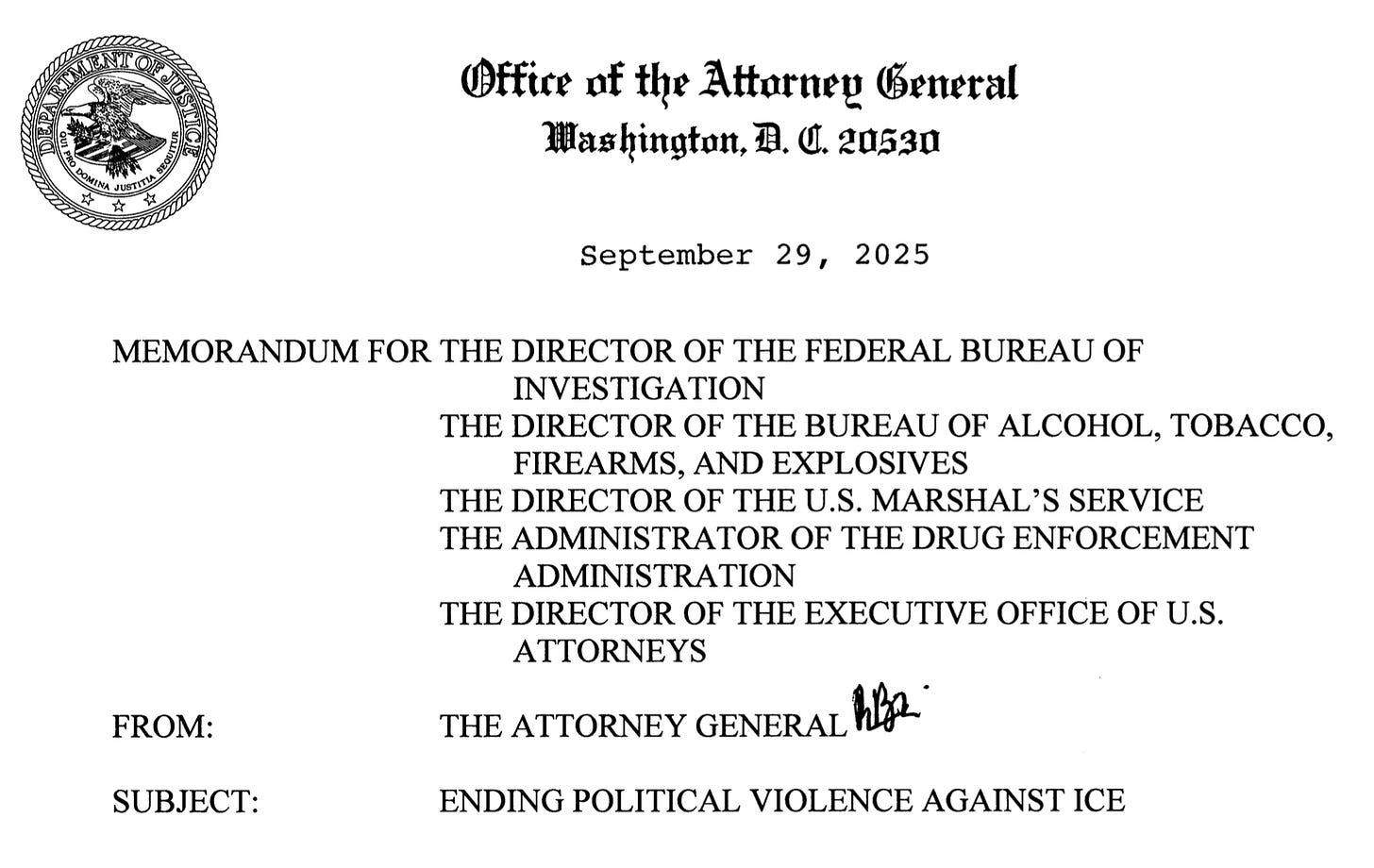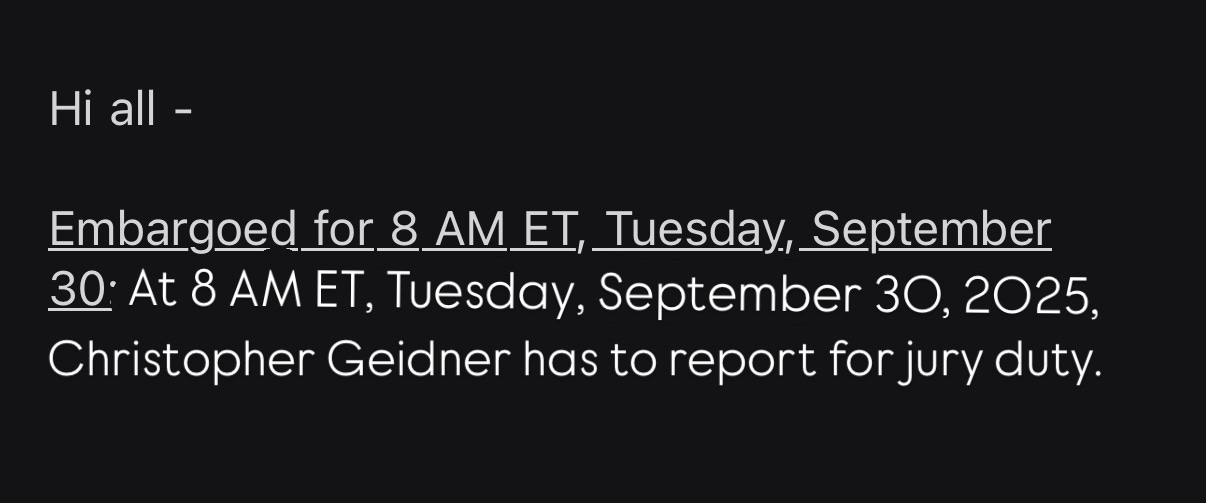A rather blustery day at Pam Bondi's DOJ
In a new ICE-focused memo implementing Trump's "domestic terrorism" directive, the attorney general says a lot of nothing.
Attorney General Pam Bondi issued a memorandum on Monday that purports to aim at “ending political violence against” U.S. Immigration and Customs Enforcement in implementing President Donald Trump’s memo from last week that called on federal agencies to respond to “domestic terrorism.”
While Bondi’s memo started off by discussing recent assassinations and other shootings, it quickly moved on to citing the Trump administration’s own characterization of recent protest events in which no shots were fired, let alone anyone killed. Referencing those protesting outside ICE facilities in Chicago and Portland, Oregon, Bondi stated, “These rioters have been well-organized and appear to be well-funded” — a claim made by the U.S. attorney general without even so much as a citation to a self-serving administration source.
There was a lot of bluster in the memo. As to actual policy, however, it was not clear what of the directives she announced in the memo actually change anything. Although there is some concerning language throughout the memo, many of the actual directives in the memo are already the administration’s policies — and some are already being implemented at DOJ.
For example, in the memo, Bondi ordered law enforcement officials under the Justice Department’s control — Bureau of Alcohol, Tobacco, Firearms and Explosives, United States Marshals Service, Drug Enforcement Administration, and Federal Bureau of Investigation — to “immediately” send officers and agents to “to defend ICE facilities and personnel“ wherever they are “under attack” — including to Chicago and Portland, Oregon.
But there absolutely has already been federal law enforcement presence and support — outside of any military presence — in both cities (and elsewhere).


To be sure, Bondi’s order absolutely could lead to an increase in where such law enforcement is targeted and how many officials are sent to those places — but, as Reuters showed on Monday, that likely would ultimately lead to a drain on other enforcement priorities.
Bondi also ordered the federal prosecutors in those cities to charge with “the highest provable offense” anyone arrested for “unlawful rioting” or who is “suspected of threatening or assaulting a federal law enforcement officer or interfering with federal law enforcement operations.”
That could seem significant, but it is already the Department’s default policy — as Bondi herself announced in a February 5 memo: “[I]n the absence of unusual facts, prosecutors should charge and pursue the most serious, readily provable offense.”
Another sign that this could be more of a P.R. show — or, more specifically, a show to Trump specifically that she is implementing his memo — is that the seven footnotes in the three-page memo are three footnotes citing Trump’s memo and four footnotes citing to three news releases from the Department of Homeland Security.
It was much of the same thing throughout the memo.
In one section, Bondi announced, essentially, that every law enforcement officer in the nation — federal, state, or local — who helps protect ICE facilities or personnel becomes part of a “temporary ICE Protection Task Force.” Bondi suggests that the point of that is so that the U.S. Attorney’s Office would be able to prosecute people under a federal law against “[a]ssaulting, resisting, or impeding certain officers or employees“ if alleged to have happened to the state or local law enforcement.
The underlying federal law, however, already allows for the prosecution of a person accused of violating the law against “any person assisting such an officer or employee in the performance of such duties or on account of that assistance,“ so it is not clear whether the task force designation is even necessary for those purposes. Now, again, there may be benefits from the designation, but it doesn’t appear to be the one she suggests in her memo.
Another section suggests that grant funding through the Office of Justice Programs (OJP) and Community Oriented Policing Services (COPS) be provided to “federal, state, and local law enforcement officers protecting ICE facilities and personnel.“ Even the memo here has two caveats — that it be provided “as soon as possible,” as opposed to immediately, and that it be done “consistent with existing statutory authority” — and that’s before you get to pre-existing administration priorities that would have likely provided support for such grants when sought.
A final section both sounds the most ominous and could be the most meaningless.
First, it continues Bondi’s now-proud tradition of providing criminal defense lawyers with evidence that they can use to argue that the Justice Department is prejudicing its cases by asserting that people arrested — not convicted — are “criminals.”
Second, while this focuses on the concerning portion of Trump’s memo aimed at what I described last week as the investigation of funders and non-governmental organizations, it is important to see that Bondi’s sentence highlighted above implementing that is, essentially, a boilerplate statement of accomplice liability. And, with the “to the fullest extent of the law” language, DOJ could assert that any constitutional concerns — where such prosecution would violate the First Amendment, for example — have already been addressed.
Bondi is not a groundbreaking lawyer, and many of the good lawyers at DOJ with a solid understanding of government have left or been fired. As such, I suspect we’re going to be seeing a lot more memos like this in the future.
Memos like this — including this one — absolutely should be examined, implementation should be watched, and the inevitable overreach must get pushback. But, from my view, this memo is not much different than what had already been the policy in this administration. And while those policies already have faced challenges and will face more, this is not some dramatic escalation. A lot of this, in fact, is what we already saw in D.C. — and we’ve seen how that has gone for DOJ in court.
“Enough is enough,” Bondi wrote.
If only that were so.
Shhhh!
I was critiquing a public relations professional this evening for sending me an unsolicited email with information in it that the person was purporting to provide to me under an embargo. An embargo is an agreement, however, so it cannot be unilateral.
Nonetheless, to let you know that the coming days could get complex (or not!), here’s some embargoed (not really) information for you all!
More to come (or not!) on that front!







A “well organized riot,” huh?
Very bizarre. The whole Trump Administration seems to be performing strictly for Trump—all bombast, no substance.